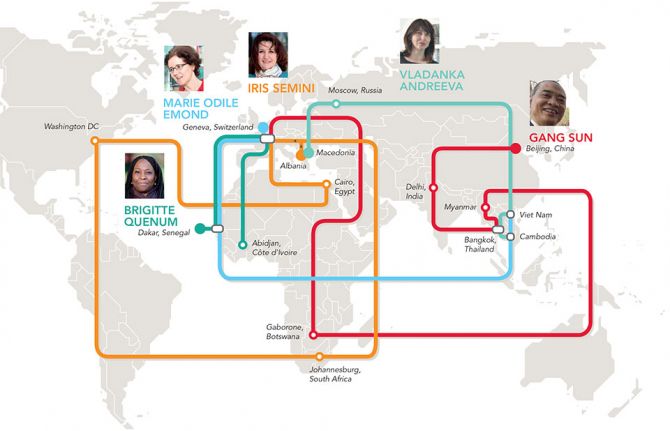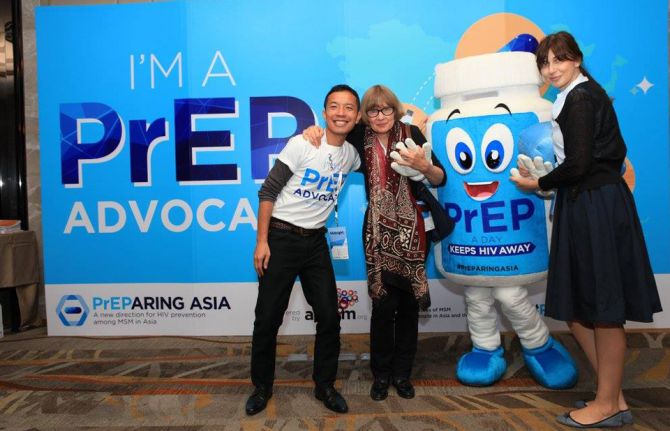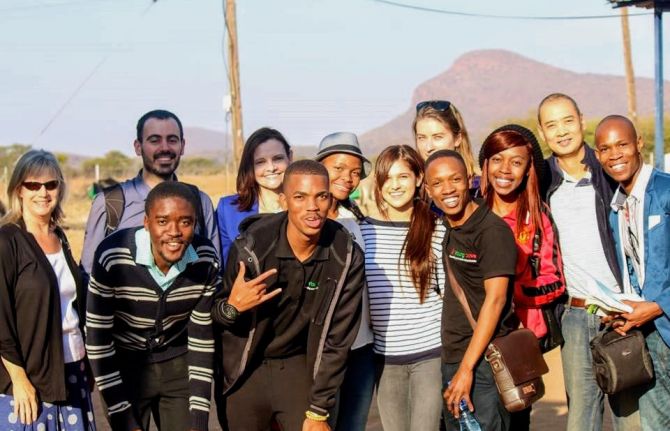



Feature Story
UNAIDS staff share global experience on AIDS through criss-crossing the world
19 March 2018
19 March 2018 19 March 2018When Marie-Odile Emond first arrived in Cambodia, she didn’t realize that some of the UNAIDS/International Labour Organization policy on HIV in the workplace she had heard discussed, years back, at the global level would be something she would see implemented.
“It seemed so abstract and yet here I was seeing it in practice,” she said, referring to health and human rights protection for workers, notably sex workers, which involved the Ministry of Labour, the community and the United Nations. “As the Country Director, I facilitated the dialogue and training for that to happen,” Ms Emond said, “and now it serves as an example for other countries.”
She now heads the Viet Nam Country Office, which she said offered another set of challenges and opportunities.
“I have found it really interesting to alternate between global, regional and country offices, because each offers a window to a part of our strategy,” Ms Emond said. Rattling off the many countries she has worked in at UNAIDS, she laughed and said, “Oh, and before UNAIDS, I worked in Armenia, Burundi, Liberia and Rwanda.”
In her opinion, meeting so many committed people from all walks of life and building bridges with them has been enriching. It’s made all the difference, according to her, in the AIDS response. “I play the coordinator, but I also had an active role in making people believe in themselves,” Ms Emond said.
Country Director Vladanka Andreeva said that her moves within UNAIDS were a huge change each time. She has served across two regions in different roles and credits her professional growth to her colleagues and the various communities she has interacted with.
“In every new post there was a challenge to quickly adapt to it, establish relationships with stakeholders and make a contribution,” she said. “You really have to hit the ground running.” Her role as the Treatment and Prevention Adviser in the UNAIDS regional office in Bangkok, Thailand, before going to Cambodia, really stands out for her. Ms Andreeva provided technical advice and assistance to strengthen HIV programmes across the region. This involved facilitating knowledge and sharing best practice, in and between countries, on innovative delivery models to scale up access to evidence-informed services.
She added that, from the former Yugoslav Republic of Macedonia to Cambodia, “my family and I explored the cultural heritage of our host countries, tasted some of the most delicious pho, tom yum and amok, and made friends from all over the world.”
She thanked her husband and daughter for being fantastic partners in the journey, since moving every four to five years is no small task. UNAIDS staff move routinely from one duty station to another, criss-crossing the world throughout their careers.
Her real pride is seeing her 17-year-old daughter, who was six when they started living abroad, become a truly global citizen, with such respect for diversity.
Gang Sun echoed many of Ms Andreeva’s points. “Because we interact with so many stakeholders, from the private sector to government to civil society, I have learned to always show respect and always listen,” he said.
For him, the journey started in the field in China, India and Thailand, followed by Myanmar and Botswana, before starting his new job at UNAIDS headquarters in Geneva, Switzerland, in 2017. He described that adapting to different cultures has kept him on his toes. “Overall, in my career I have seen every challenge as an opportunity and I have gained in confidence,” he said.
What fascinated him the most was the differences between working in high HIV prevalence countries and in countries where the epidemic was concentrated among key populations. In his new role at headquarters, he now taps into his expertise gained along the way as well as that of so many colleagues within UNAIDS and the World Health Organization.
“Despite all my experience, I still have more learning to do,” Mr Sun said.
The Côte d’Ivoire Country Director, Brigitte Quenum, jumped at the opportunity to go to the field after more than five years in Geneva. As the Partnerships Officer with francophone countries at UNAIDS headquarters, she said she learned a lot about how the UNAIDS Joint Programme functioned. That has helped her in her current role working hand in hand with Cosponsors, financial partners and civil society.
Before working in Geneva, she worked in the western and central Africa regional UNAIDS office in Dakar, Senegal. “I have gone full circle, and that has been very rewarding, because I know how the entire organization functions,” Ms Quenum said. Reflecting on the recent change in her life, aside from adjusting to the muggy coastal weather and the sheer population size of Abidjan, Côte d’Ivoire—the city has as many people as all of Switzerland—she said, “Being on the ground gives one’s job more of a sense of urgency, but I think it’s because we have daily contact with the multiple communities we’re serving.”
More in this series: It’s about the people we serve: UNAIDS staff connecting the world



